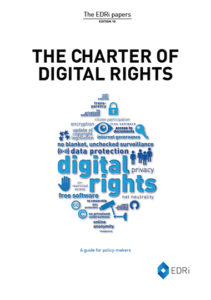EDRi Awards 2014
For the first time this year and with great solemnity, EDRi presents its first annual awards.
1. The “Humpty Dumpty Award” for the most silly “statistics”.
Winner: Deutsche Telekom, for its “One Million Cyber Attacks per day”. This statistic was not plagiarised by any of DT’s employees.
Honourable Mention: TERA for its “study” on losses from IPR infringements.
2. The “WTF award” for the most meaningless amendment.
Winner: MEP Vicky Ford for this masterpiece, indicating strong support of – and strong opposition to – net neutrality:
12. Strongly believes in the principle of an open internet where traffic is treated equally in a non-discriminatory manner; recognises, however, that the increase in the use of the internet, in particular Internet Protocol TV, has put further pressure on service providers to efficiently manage their network capacity using traffic management tools; believes that any further legislation in this area must have consumer protection at its core whilst permitting necessary traffic management and specialised services where they are not materially detrimental to other users, and at the same time endowing authorities with the ability to take action against criminality;
3. The “cranial fracture facepalm” award
Winner: Eric Schmidt, for his his amazingly ill-infomed advice that people can avoid NSA surveillance by using “incognito” mode in the Google Chrome browser.
4. The “I’ve just shot myself in the foot” award, for the most successful piece of economic self-flagellation
Winner: AEDE Association (Spanish: Asociación de Editores de Diarios Españoles; AEDE); is a trade association for Spanish newspaper publishers based in Madrid, Spain.
They successfully lobbied to force Google to pay them for driving traffic to publishers’ websites (even if the publishers did not want to impose the charge). Google News then left the Spanish market, leaving the publishers without the readers that would have found their articles through Google News.
5. The “we don’t need laws, we need law enforcement” award for blind abandonment of law “in the name of law enforcement”
Winner: The award goes to UK Prime Minister David Cameron, for arguing that it was “ridiculous” to assess the legality of massive, suspicionless, long-term storage of air passenger records, even though Europe’s only other legislation on massive, suspicionless, long-term storage of data was declared invalid earlier this year.
More seriously… here are some good initiatives…
Top five digital rights publications of the year (which aren’t really the top five, just the ones we could remember without doing much research… we’re kinda busy):
1. Council of Europe Human Rights Commissioner (prepared by Prof. Douwe Korff):
Issue paper: The rule of law on the Internet and in the wider digital world (pdf).
2. UN High Commissioner for Human Rights:
Report of the Office of the United Nations High Commissioner for Human Rights: The Right to Privacy in the Digital Age (pdf)
3. Not a publication, exactly, but the Privacy Badger privacy enhancing tool from the Electronic Freedom Foundation:
EFF: https://www.eff.org/privacybadger

